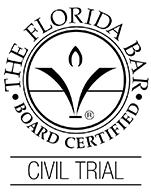You might be familiar with the frustration of sitting at an intersection, unsure if it’s your turn to go, or feeling anxious as another driver seems to ignore the traffic signal. Misunderstanding right-of-way rules can lead to dangerous situations and accidents. If you’re a Florida driver, knowing how to handle these scenarios can make a big difference in preventing collisions and ensuring everyone stays safe.
At Dismuke Law, we know how frustrating it is to suffer an injury in an accident caused by confusion over right-of-way rules. Our personal injury lawyers are experienced with Florida traffic laws and have what it takes to protect your rights and navigate the complexities of your case. Whether you need assistance with insurance claims or pursuing legal action, we are committed to providing the personalized support you need.
What Is Right-of-Way?
Right-of-way refers to the legal right to proceed first in a traffic situation. It determines who has priority in various driving scenarios, such as at intersections, pedestrian crosswalks, and when merging into traffic. These rules are designed to keep traffic flowing smoothly and prevent accidents by establishing clear guidelines for drivers, cyclists, and pedestrians.
In essence, right-of-way rules dictate when you should yield to others and when it’s your turn to move. Understanding and following these rules is crucial for maintaining road safety. Failure to yield the right-of-way can lead to serious accidents, resulting in injuries, damages, and legal consequences.
What You Should Know About Florida’s Right-of-Way Laws
In Florida, right-of-way rules are intended to keep drivers from making unsafe or unpredictable decisions at intersections. Here’s what you should know:
- Intersection With No Signals: At an intersection without traffic signals, the vehicle on the left must yield to the vehicle on the right. This helps avoid confusion and collisions where there are no traffic lights or signs to guide drivers.
- Stop Signs: When approaching a stop sign, you must come to a complete stop and yield to any vehicles or pedestrians in or approaching the intersection. If two vehicles arrive simultaneously, the one on the left must yield to the one on the right.
- Yield Signs: At a yield sign, you must slow down and yield to any oncoming traffic or pedestrians. If it is safe to proceed without affecting other road users, you may continue without stopping.
- Turning Left: When making a left turn at an intersection, you must yield to all oncoming traffic and pedestrians crossing the intersection. This helps prevent accidents by preventing the obstruction of other vehicles or pedestrians.
- Roundabouts: In roundabouts, you must yield to traffic already in the circle. This helps maintain a smooth flow and reduces the likelihood of accidents within the traffic circle.
Knowing these rules can help you make safer driving decisions and avoid legal issues. Conversely, misinterpreting right-of-way laws can lead to traffic violations, accidents, and potential legal troubles.
How Right-of-Way Laws Could Impact a Car Accident Injury Claim
Right-of-way laws play a fundamental role in determining liability in car accident injury claims. When a driver fails to yield the right-of-way and causes an accident, they are often considered at fault. This determination of fault is vital when seeking compensation for injuries and damages.
If you were involved in an accident where another driver violated your right-of-way, proving this can strengthen your case. The clearer the evidence that the other driver failed to follow right-of-way rules, the more likely you are to receive compensation for medical expenses, lost wages, and other related costs.
On the other hand, if you were partially at fault for not yielding the right-of-way, it could reduce the amount of compensation you may be able to recover. Under Florida’s comparative negligence rules, your compensation is reduced by the percentage of your fault. For example, if you are found to be 20% at fault for the accident, your compensation would be reduced by 20%.
Protect Your Rights After a Right-of-Way Accident
Accidents at intersections are often the result of drivers failing to follow right-of-way rules, leading to dangerous collisions. At Dismuke Law, we have extensive experience handling cases involving traffic violations and can help you build a strong case if you’ve been injured due to another driver’s negligence.
Don’t let confusion over right-of-way laws leave you at a disadvantage. Contact us today for a free consultation at (863) 250-5050 or visit our contact form.


![cftla-member[2]](https://www.1800askdave.com/wp-content/uploads/2022/03/cftla-member2.png)
![cftla-member[3]](https://www.1800askdave.com/wp-content/uploads/2022/03/cftla-member3.png)










